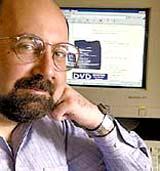Computing
Last Week's Headlines | Gamers Archives | Main Index | Y2K story archives | Virus /Worm archives |
| Computing - August 21, 2000 |
CMU scientist sees both sides of DVD case
 David Touretzky, a computer science faculty member at Carnegie Mellon University, testified in the federal case brought by the movie industry to prevent people from unscrambling DVD's on their computer. (Joe Appel/Tribune-Review photo)
David Touretzky, a computer science faculty member at Carnegie Mellon University, testified in the federal case brought by the movie industry to prevent people from unscrambling DVD's on their computer. (Joe Appel/Tribune-Review photo)
|
TRIBUNE-REVIEW
David Touretzky won a battle for the First Amendment, but lost one for technological freedom.
That's how Touretzky, a principal computer scientist at Carnegie Mellon University, sees the outcome of a federal case concerning the publication of software code that unscrambles DVDs.
Touretsky served as an expert witness on behalf of 2600 magazine, an underground publication and Web site for hackers. U.S. District Judge Lewis Kaplan issued a ruling Thursday barring the magazine's publisher from republishing the code, which hackers use to copy and trade movies on the Internet.
"The good thing about the judge's ruling is he bought my argument that computer code has expressive content," Touretzky said. "It means the code is speech.
"If the code wasn't speech, it would be very easy to censor it."
Touretzky considers the ruling a blow for consumers and a victory for the eight Hollywood studios such as Metro-Goldwyn-Mayer Inc. who filed the lawsuit. They contend that publishing the software violates the U.S. Digital Millennium Copyright Act of 1998.
That law makes it illegal to circumvent any technology that controls access to copyrighted material and to "traffic" in that technology.
The publisher plans to appeal the ruling.
Touretzky explained that every DVD has two codes.
The Content Scramble System encrypts the movie, which is unscrambled by a DVD player. Another code prevents people from one continent from watching the movie on a machine in another region. In some countries, however, consumers can pay about $50 at an electronics store to change a chip in a DVD player so that it will ignore the region codes.
It's against the law to do that in America, Touretzky said.
One of Touretzky's colleagues at Carnegie Mellon, Michael Shamos, served as an expert witness for the studios. According to Touretsky, Shamos contended he spent 20 hours to unscramble a movie, which could then be pirated over the Internet.
Shamos was unavailable for comment.
Touretzky said it would take much less time just to rent a movie at a store.
During the trial, he demonstrated how computer code, the language computer scientists use to talk to each other, can be converted to English. He contended that the movie industry has tried to outlaw sharing computer codes that hurt its profits, while the First Amendment protects the distribution of more dangerous ideas.
"It's illegal for me to give you LSD, but I can give you the recipe," he said. "I can't give you a pipe bomb. But I can give you a book about how to make a pipe bomb."
Jack Valenti, chairman of the Motion Picture Association of America, hailed the judge's ruling. The association is a trade group for the big studios.
Thursday's "landmark decision nailed down an indispensable constitutional and Congressional truth: It's wrong to help others steal creative works," Valenti said in a prepared statement.
A.J. Freyvogel, custom installation manager for Audio Junction Inc. in Dormont, further defended the movie industry's position.
"If people are able to swap DVD software like that, it's going to eat into a substantial portion of the studio's income," he said.
"A lot of times," he continued, "movies break even at the box office and bring a profit at rentals and sales."
He said DVDs are especially important because their sales will outstrip VHS sales within two years.
But Touretzky said freedom of speech is more important than a studio's profits.
"Computer code is a way of expressing ideas," he said. "Any attempt to limit the expression of ideas is a threat to our society."
Wire services contributed to this report.